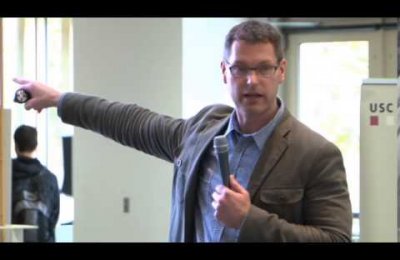By Jeremy Rosenberg
It typically takes 20 years before an academic journal is accepted for listing in the "indexes" that open the door to increased visibility, readership and submissions.
USC Annenberg Press was only a year old in January 2007 when it launched the International Journal of Communication (IJoC). By November 2011, IJoC was already indexed by "gold standard" gatekeepers such as Thomson Reuters, home to social science indexes such as SSCI, SCI and ISI.
If ever a publication was destined to shatter the usual two-decade wait, it was IJoC. The inter- and multi-disciplinary journal that publishes online has a particularly prestigious lineage – the journal was co-founded and is co-edited by USC Annenberg faculty Manuel Castells and Larry Gross.
Castells, the most cited communication scholar in the world, was recently honored as the 2012 winner of the Holberg International Memorial Prize. Gross, likewise heavily decorated, is the 2011-2012 President of the International Communication Association (ICA) as well as USC Annenberg's vice dean and School of Communication director.
"IJoC originated during a lunchtime conversation that I had with Manuel," Gross says, "in which we agreed that we were frustrated that commercial publishers were not doing what could be done with online publishing."
And so Annenberg Press was born, guided by the tenets of independence, free and open access, premiere editorial boards and authors, and deep and distant interests and reach.
The Press, says managing editor Arlene Luck, is a rare example of a school operating its own academic publishing arm, free for the most part from deals with professional associations and/or commercial imprints.
Are other schools envious of what USC Annenberg has accomplished? "Not only envious," Luck says, "but trying to emulate the model."
Annenberg Press publishes four journals. The others are: Information Technologies and International Development (ITID), founded by USC Annenberg Dean Ernest J. Wilson III and co-edited by Wilson, USC Annenberg professor François Bar and Georgia Tech's Michael L. Best; Media, War & Conflict, co-edited by USC Annenberg professor and director of the Center on Public Diplomacy Philip Seib; and The Image of the Journalist in Popular Culture Journal (IJPC), run by co-founding editor Joe Saltzman, a USC Annenberg journalism professor.
What do the four publications have in common? "Their standards are all extremely high. The editors are some of the most renowned scholars in the world. And each journal is absolutely unique in its field," Luck says.
Annenberg Press also supports PD Magazine, a print and online journal run entirely by students interested in public diplomacy.
"The key to communication in the 21st century is convergence, and the quality publications of the USC Annenberg Press reflect that fact," says Jerry Edling, the magazine's editor-in-chief and a public diplomacy master’s candidate. "PD Magazine, which is squarely in the cross-currents of communication and international relations, is honored and proud to be among them."
Edling and his student colleagues aren't the only people who consider an Annenberg Press association a source of honor and pride.
The number of annual submissions to IJoC skyrocketed from 55, prior to the journal's debut issue, to 290 in 2010 to 402 last year. As competition soars, acceptance rates declined from 45 percent in 2007 to 11 percent last year. And submissions have come from scholars in at least 58 nations; in fact, nearly half of the total submissions are from outside the United States.
IJoC, at last count, has 6,414 registered online users. In 2010, the journal received 29,966 unique visitors. During 2011, it published a total of 146 articles, features and book reviews – an all-time high for the journal.
There are behind-the-scenes consequences of IJoC's success, as well as the successes of the other Annenberg Press publications.
Luck, three communication Ph.D. student workers, and, as needed, freelance ex-Los Angeles Times copy editors are challenged with keeping ahead of the ever-expanding volume of tasks such as editing, proofing, formatting, marketing and distributing the journals.
Those responsibilities will likely grow, as Annenberg Press is planning to launch an electronic books series. The program's pilot project will be a compendium of previously published texts and visuals of the late UPenn communication professor, Sol Worth.
Gross says lessons learned during the Worth project would then be incorporated into a peer-reviewed e-book series featuring original work. Annenberg Press' involvement, Gross says, "offers scholars the confidence that if they publish, the work will be taken seriously by the profession and by their institutions."








